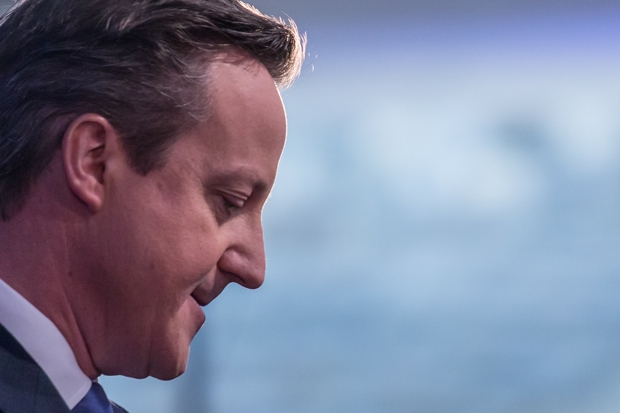At last! We can now see why David Cameron tried to keep this quiet. He sold his shares in January 2010 – just as the recovery was starting. What a dunce! His £31,500 would be worth a lot more by now if he’d held, and diversified his portfolio. So can you trust him with the nation’s finances? And this, as far as I can make out, is the limit of the scandal. All else is spin and smear.
The spin, of course, matters. The Prime Minister has behaved as if he had something to hide when he didn’t. His carefully-worded highly-specific non-denial denials (‘In terms of my own financial affairs, I own no shares…’) were the equivalent of screaming ‘ATTENTION JOURNALISTS!!! HIDDEN STORY!!! LET THE GAME BEGIN!’ and beaming the words on to the Houses of Parliament with a Gail Porter-style projector. The golden rule of political crisis management is to make all of the information public at the very start: the drip-drip makes it look like there is a scandal, even when there isn’t. New Labour would have handled all of this so much better.
Cameron erred because he got emotional. His deceased father was in the news and Cameron thought: ‘Screw them. I know he wasn’t dodgy, I know there is nothing dodgy about Blairmore – so I’ll be damned if I’m going to let bored journalists with nothing to do in the Easter recess drag him through some Fleet St court. I’ll tell them it’s a private matter, and they can go hang.’ One day, this might end up in a textbook of how not to handle a political crisis. Cameron’s strategy had the exact opposite effect, and the whole truth had to be dragged out over five days.
He should probably have sold the shares when he became leader in 2005, or disclosed their existence earlier. Any new information can be made to look dodgy, especially if it’s pulled from a Prime Minister’s mouth by Fleet St tweezers. That’s the irony of this government: the substance is good, the spin is abysmal. As Cameron has just demonstrated.
And the smear? The notion that offshore equals tax avoidance. This is the careful trick being played by the BBC and Cameron’s various other tormentors (you can see why he gave his interview to ITN’s Robert Peston). They want to say he is ‘caught up’ in the scandal with tax avoiders and Panama plutocrats. Only by the inclusion of his father’s name: there is a night-and-day difference between Blairmore Investment Fund and what the Chinese and other authoritarians have been up to.
Blairmore was set up in 1982, after the Thatcher government abolished exchange controls. All of a sudden, British investors could invest in dollar-denominated shares – and at the time, the easiest way to do that was through a vehicle domiciled in places like Panama (and buying off-the-shelf products from companies like Mossack Fonseca, the source of the 11m leaked documents). But crucially, tax would be charged in full, in Britain, the same way as if you’d bought and sold shares in Marks & Spencer.
How has a trillion quid ended up being invested in Jersey? Because the island is dodgy? No, it’s because of tax neutrality: with zero corporate tax, investors can ensure they’re not exposed to double taxation. They then only pay taxes due in their home countries. That, plus security: the government is less likely to steal the money, or (if you’re Italian) denominate it in a new currency. There are a great many invaluable uses for offshore investment vehicles. Having Blairmore domiciled in Panama would, in 1982, have allowed British investors access to dollar-denominated shares while being able to treat the whole enterprise as a normal British investment paying normal British tax.
When I was a business journalist, I came across such arrangements all the time: they’re the hallmark of globalised investment, not tax evasion. This facile logic – offshore means dodgy – has been a useful stick with which to beat the Prime Minister for the last few days. But it wilfully overlooks the facts of global finance: that investors reduce the risk of investing in unstable parts of the world by having the cash domiciled in places that act as global investment hubs. To be a hub, you need to charge zero tax. In this way, small and relatively poor islands have been able to build up considerable financial service expertise – and compete with rich financial centres. The Cayman Islands do hedge funds, Bermuda does insurance. Panama, in the 1980s, was a pioneer in all of this.
Whether you dodge tax depends on whether you disclose everything to the taxman. Tax evasion is a crime that can be committed by a plumber or a plutocrat: Ian Cameron didn’t dodge tax, and neither did David Cameron. There is no suggestion to the contrary, only tricksy Tom Watson-style innuendo.
Behind all this, of course, we can see a good deal of inverted snobbery: Labour attack dogs like Watson have always been driven mad by the fact that the country elected an Old Etonian as Prime Minister – that voters don’t seem to resent the fact that he was wealthy. The Panama scandal has given many class warriors a chance to reprise their old theme – by insinuating that rich means dirty, and that the Prime Minister is both.
He hasn’t made it easier for himself, but at the end of all of this drama what do we have? Conclusive proof that the Prime Minister is indeed the son of a stockbroker, and that he’s not very good at spin. And, I’m afraid, is the full extent of his wrongdoing.







Comments